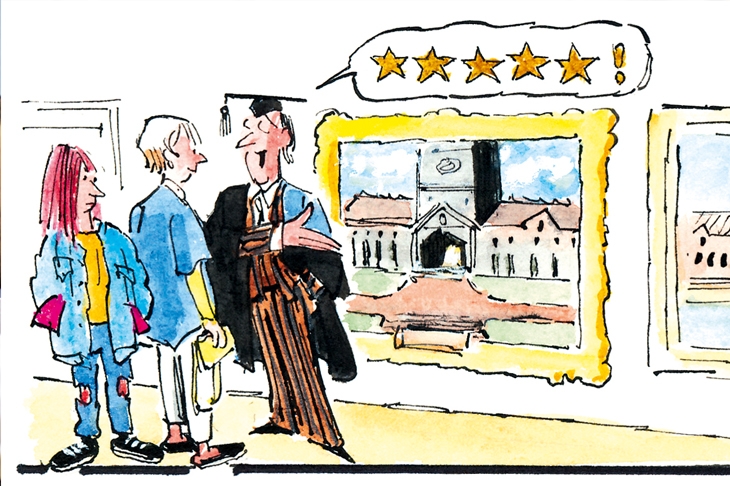Ludgrove
There aren’t many traditional all-boys, full-boarding prep schools left in the UK, but Ludgrove in Berkshire is one. ‘Our boys speak for themselves and it is them that make Ludgrove special. They are full of spark and never short of things to say,’ according to the school. There are two mantras of Ludgrove life, ‘Be kind’ and ‘Be the best you can’, while the school motto is: ‘Whatsoever thy hand findeth to do, do it with all thy might’ (Ecclesiastes 9:10). Ludgrove has a strong academic record — around 70 per cent of the top year go on to Eton, Harrow, Radley or Winchester — but sport and tradition are just as important. One unique sport is stump in the yard: a special game of cricket played against any wall all over the school. Another is Sets Football, where around 35 boys from each house play one other in a huge game. With 70 odd boys on a pitch, and three referees looking after three footballs, it’s more like organised chaos than anything else.

University College School
Originally founded as part of University College London in 1830, University College School (or UCS to most) moved to Hampstead in 1907. This independent day school for boys, now with a co-ed sixth form, is famous for its liberal ethos (the UCS foundation was set up to ‘promote the Benthamite principles of liberal scholarship’), with music, drama and the arts all thriving. That doesn’t mean it isn’t academic: in 2017, 90.9 per cent of the pupils’ GCSEs were
A* or A, with a 100 per cent record of A or A* in German, Mandarin and music. One recent parent described the school as ‘not too formal, but focusing on what really matters for a well-rounded education’, with ‘very approachable teachers’. Another, when asked about its strengths, said: ‘The question is what aren’t the strengths? The school is exemplary at preparing our boys for the real world with dedicated teachers who take the time to know our children.’

Drumduan School
Drumduan School, in Forres, east of Inverness, is one of those schools that makes the papers simply for existing. Why? Well, as the headlines say, pupils sit ‘no exams’ and ‘leave with no qualifications’. How does that work? The school bases its curriculum on the work of Rudolf Steiner, but also includes elements of the Scandinavian folk schools, the Forest school movement and democratic schools. While the school initially focused on children aged 14-18, it has recently taken over the running of the Moray Steiner School, meaning children from toddler-age to sixth form can experience its ‘dynamic approach’ to learning. Subjects such as chemistry, geography, maths and English are all taught, but there’s also voluntary service, outdoor activities (for which the Moray Coast location is perfect) and ‘body-based learning’, which includes knife-making, canoe-building and tai chi.

Ashbourne College
This independent co-educational school for pupils from 14 to 18 has a superb central London location, close to Kensington Gardens. The school considers its primary strengths to be a friendly, caring approach, combined with a challenging curriculum and outstanding results. Although a fee-paying school, Ashbourne does offer partial scholarships to gifted students, especially those talented in music, drama or art. Each student has a personal and UCAS tutor, and the teaching groups consist of, on average, seven pupils — allowing students to experience a seminar-based approach. Ashbourne’s small class sizes and personal-tutor system enable teachers to engage directly with the needs of each individual which is vital, especially in sixth form. The school provides excellent preparation for applications to top universities, with specialist programmes for Oxbridge, medicine, engineering and law. Fifty per cent of students go on to Russell Group universities.







Comments